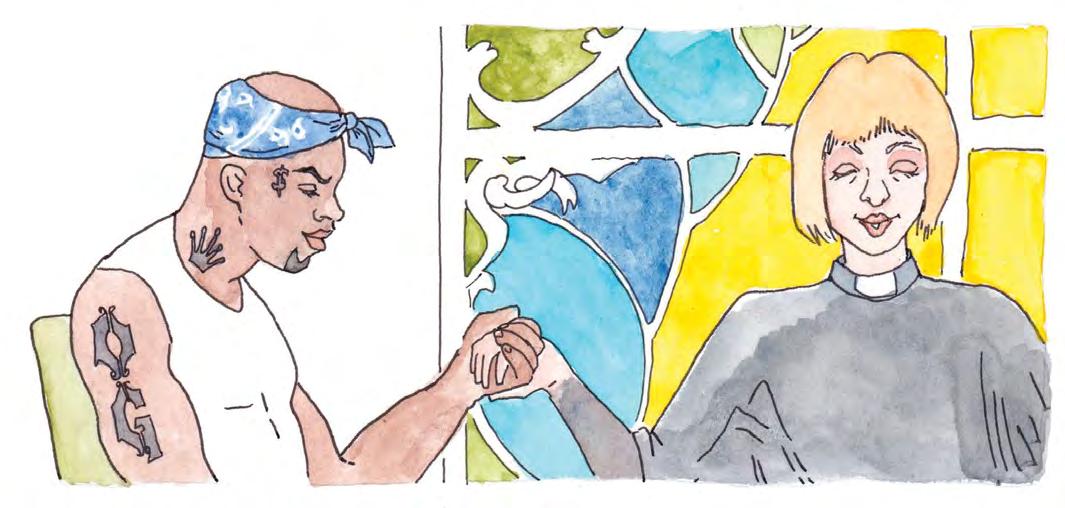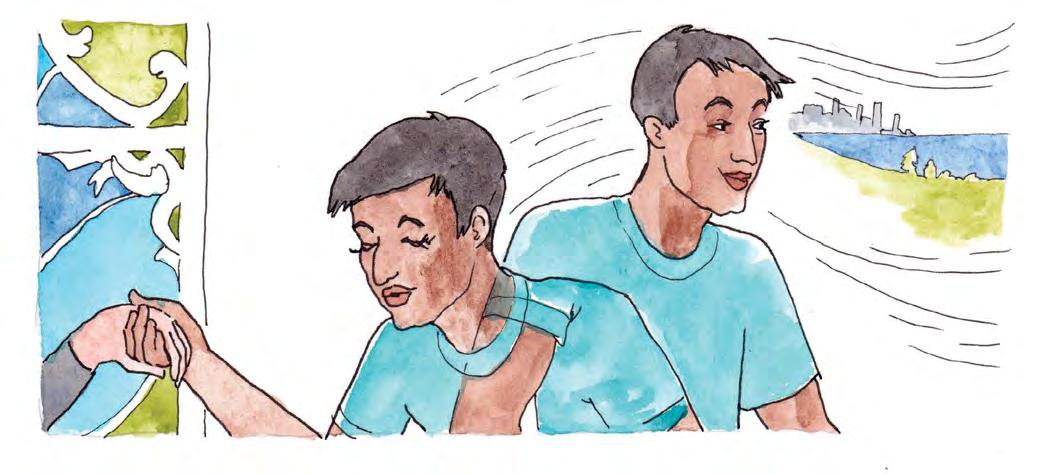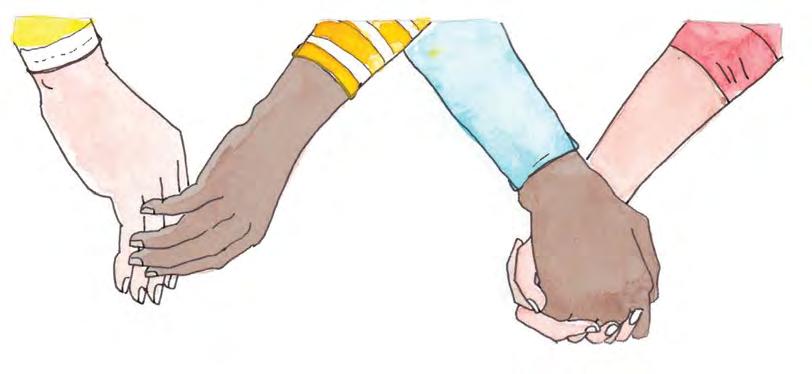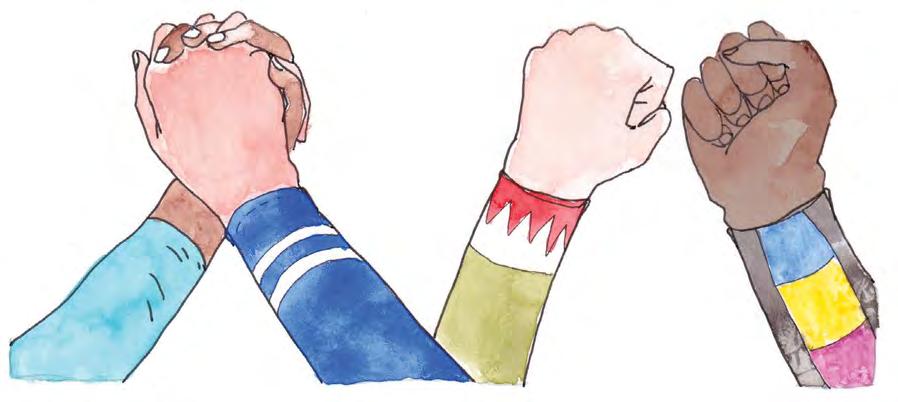
6 minute read
Moral Injury and the practice of Moral Repair
Moral Injury and the practice of
“... Moral injury destroys Moral Repair meaning and forsakes noble causes. It sinks After listening to Walidah’s story, Amy wanted to raise a point about one of her cousins who had returned from the army as a different warriors into states person. For so long she had tried to sort out in her mind what lies of silent, solitary behind those who hurt others and the source of moral injury. suffering, where bonds “Some people hurt others out of something that is hurt and broken of intimacy and care inside of them. And others feel they must act in a way that violates seem impossible.” their core beliefs because they have pledged loyalty to a group that requires that they take that action. Soldiers in war, like my cousin. Or possibly people in a gang. Or hospital workers who have to triage critical care patients, essentially letting them die to prioritize those who have a better chance of living.” Joel looked solemn. “Is this not essentially about the role that guilt plays? So many people who experience moral injury, also experience a level of guilt when they have overstepped their basic moral identity and violated some of their core moral beliefs. Parts of themselves have been lost - parts that bear the image of God. Therese Rando talks about paying attention to guilt - brought about by those moments when we feel we should have done more or that we missed an opportunity to do the right thing. This is where churches play an important role in creating the space for confession, for sharing those moments of guilt, for telling our stories so that we can find our way back to our Imago Dei.” Amy looked around the circle. “At the seminary, we looked at what the authors Rita Nakashima Brock and Gabriella Lettini said about moral injury. They said that it “comes from having transgressed one’s basic moral identity and violated core moral beliefs. ... Moral injury destroys meaning and forsakes noble causes. It sinks warriors into states of silent, solitary suffering, where bonds of intimacy and care seem impossible.” I really like that definition.” Paula nodded. “I guess that moral injury has to do with one's perception of right and wrong.” Joel tilted his head sideways as if he was trying to look back into another time. “When I went to basic training, as part of our orientation we were often reminded of what President George W. Bush said in 2001, “We go forward to defend freedom and all that is good and just in our world.”
Advertisement
At the time, I thought that “we” included me, and I really believed that as part of the army I was going forward to do something good. Yet many of the memories I carried home still cause me guilt and shame. I suffered moral injury for sure, and it took many hours of therapy and prayer to help me accept the new me.” Paula nodded. “Yes, it seems like the main point of this story is how the military culture deconstructs a person's core moral compass and substitutes new values to enable them to carry out the acts of war. The challenge of moral injury comes when a person is required to carry out acts that conflict with their fundamental core of who they are, when the constructed values the military substitutes are not actually strong enough to hold the horror of the experience.” Amy added, “I think that we all know deep in our core when what we have been asked to do is not right and violates what we know and want deep down inside. That violation is so disruptive to our sense of integrity and coherence, so shameful that it can make us feel inhuman, cut off from ourselves, from others, and from God.”
Joel nodded. “Let’s face it, the military has failed to address moral injury or trauma. They invented the term "shell shock" but didn't address it for many decades. Congregations should be called to think about ministry for vets and resource them.” “Definitely,” Amy added. “So many female, and maybe male vets were exposed to trauma from their peers and combat trauma. The military has come a long way, but there's still much to be done!” Paula sighed. “So how does a pastor help restore a person's sense of integrated identity and re-connect them to their core sense of themselves as being good and worthy? I'm not sure what the literature says, but unconditional love and companionship are central to healing.” Joel nodded. “Again, acknowledging and not minimizing the harm caused is essential. The whole story of the damage done must be told, including understanding the full consequences. If I only loosely mention the harm I cause, I will know deep down that I am not facing it thoroughly and it will continue to fester inside me. This is similar to the role of confession, I would say. “... The challenge of moral injury comes when a person is required to carry out acts that conflict with their fundamental core of who they are, when the constructed values the military substitutes are not actually strong enough to hold the horror of the experience.”

The real work here is to move to the positive and life-giving essence that still lives inside people, even though they have caused harm, even death. “Furthermore, the story of how the military shifted their moral identities must be surfaced, so they can see that they were one among many whose morality got rewired. This is the systemic past of the story. Although they must confront their own responsibility, they must be helped to see that this was part of a pattern of systemic indoctrination. “But that is just the beginning, helping people to move through the painful past. The real work here is to move to the positive and life-giving essence that still lives inside people, even though they have caused harm, even death. And to bring that life essence to the fore. The bridge is to validate why the person feels so much shame and guilt. Not to rub it in but to do the opposite. This helps to reflect their humanity to themselves, which they have probably lost sight of. The fact that they feel shame and guilt comes from their essence of goodness, still living in them, however, suppressed, wanting to speak, to return. This sets them back on the path to reclaiming their fundamental goodness, which comes directly from God’s love for them without question. Then we help them see, through our love for them, that they still have the community's support and the opportunity to make healing contributions in the world–to do good. They are still doing all the work, but you are helping them open their eyes to the inner and outer realities they have become blind to.” Paula spoke. “That makes so much sense, Joel. I can see that you have had to deal with much, and I am so thankful we have someone with your experience to guide us. What came to mind when you were speaking is the Healing Centered Engagement which I have heard being mentioned more and more by practitioners. All of the elements of dealing with Moral Injury that you described seem to be there, from working with the positive aspects of people, their assets, the restoration of identity and the systemic contextualizing of trauma and the role of community in the healing process. Here is a small handout on the basic elements.”












